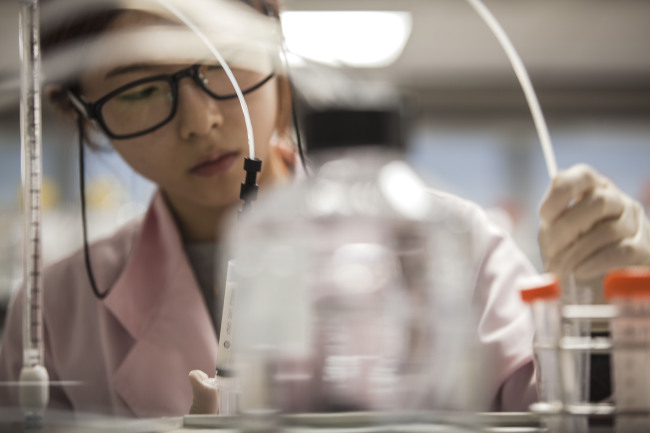Samsung Bioepis said Monday that it would jointly fund and co-develop multiple novel biologic therapies with Japan’s Takeda Pharmaceutical, expanding its current business from making copies of existing biologic drugs to developing original drugs.
Under the partnership, the two companies will begin developing new drug candidates in unmet disease areas, starting with a new treatment for severe acute pancreatitis labeled TAK-671.
The deal marks a milestone for the biopharma development unit of Samsung Group, launched as part of the conglomerate’s future businesses initiated seven years ago by its currently bedridden Chairman Lee Kun-hee.
The firm’s business portfolio will now encompass new drug pipelines in addition to multiple biosimilars -- cheaper, near-replicas of live cell biologic drugs whose patents have expired.
 |
A Samsung Bioepis employee works inside a research lab at the company’s headquarters in Songdo, Incheon. (Samsung Bioepis) |
“Five years ago, we entered the biopharmaceutical industry with a strong determination to transform the way therapies are brought to patients by replacing legacy processes with new and innovative ones,” Samsung Bioepis CEO and President Ko Han-sung Ko said in a statement.
“Together with Takeda, we look forward to realizing this vision by accelerating the development of effective therapies for patients who are currently without a viable treatment option,” Ko said.
Samsung Biopeis said the “risk-sharing partnership” would connect its speedy biologics development platform with Takeda’s drug development expertise to co-fund and collaboratively develop innovative therapies. Additional terms of the collaboration were not disclosed.
Samsung Bioepis was founded in February 2012 as a joint venture between Samsung BioLogics -- the contract drug manufacturing arm of South Korea’s Samsung Group -- and the US-based Biogen.
The two Samsung units stand at the center of South Korean tech conglomerate Samsung Group’s foray into biopharmaceuticals, which it saw as a promising area that can supplment, or eventually replace, its flagship electronics business.
Though a latecomer to the biosimilars market, Samsung Bioepis has risen as a formidable player in the sector by introducing the first biosimilar copy of Amgen’s blockbuster arthritis drug Enbrel in Europe last year.
The drugmaker’s Remicade-referencing biosimilar, Renflexis, has also scored approval from both European and US drug regulators. Biosimilars referencing AbbVie’s Humira and Roche’s Herceptin have also been filed for approval by the European Medicines Agency.
In the case of Samsung’s Herceptin-referencing biosimilar, it is expected to become the first of its kind to score approval from the EMA, giving it a “first product” advantage in the region’s market.
Looking ahead, Samsung Bioepis will review additional partnerships with other global pharma companies, as it seeks to become an original drug developer, which the firm considers as its final goal despite its beginnings on the biosimilar front, a company spokesperson said.
Meanwhile, Samsung Bioepis said it is still in the process of reviewing a public listing on the US-based Nasdaq. It had pursued a Nasdaq listing in 2015, but had postponed its plans at the time, citing market volatility.
By Sohn Ji-young (
jys@heraldcorp.com)





![[Weekender] Korea's traditional sauce culture gains global recognition](http://res.heraldm.com/phpwas/restmb_idxmake.php?idx=644&simg=/content/image/2024/11/21/20241121050153_0.jpg)


